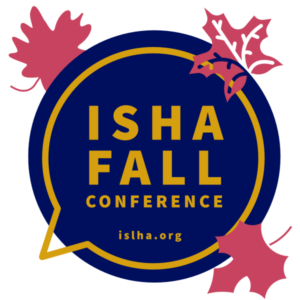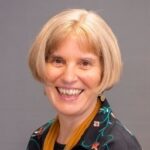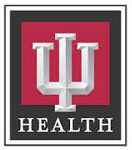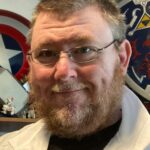
An Online Learning Event:
Neurodiversity Across the Lifespan (4 Sessions)
ISLHA Members: $75 / ISLHA Student Members: $20
Non-Members: $125 / Student/IVDN Non-Members: $30
Not a current member? Learn more and join today!
Presented by: Amy Gunn, MS, CCC-SLP
Abstract
During this presentation participants will explore the concepts of disability and neurodivergence, and how speech-language pathologists can approach their role in providing care to neurodivergent (ND) individuals throughout the lifespan. Traditional versus ND-affirming care will be discussed. Participants will be asked to reflect on how diveristy, equity and inclusion efforts, guidance from neurodivergent self-advocates, and evidence-based practice, should be considered while working with ND patients and their families.
At the conclusion of this presentation, the participant will be able to:
Time-Ordered Agenda
5 minutes: Introduction
15 minutes: Models of disability
15 minutes: Neurodivergence as disability
15 minutes: Neurodivergence and DEl
15 minutes: Research, evidence based practice and reports from the ND community
15 minutes: Implications for speech-language pathologists
10 minutes: Question/Answer
Presented by: Amy Gunn, MS, CCC-SLP
Abstract
In this presentation participants will explore foundational concepts of bioethics and how we may apply them to our decision-making and practice while serving the neurodivergent community. We will discuss current research and how viewing this Information from an ethical perspective may challenge our current practices. Finally, we will review ASHA’s Code of Ethics and apply these standards to our neurodivergent (ND) affirming practices.
At the conclusion of this presentation, the participant will be able to:
Time-Ordered Agenda
5 minutes: Introduction
20 minutes: Foundations of bioethics
10 minutes: ASHA’s Code of Ethics
20 minutes: Current research
25 minutes: Applying ethical principles to ND-affirming care
10 minutes: Question/Answer
Presented by: Matt Lowry, LPP
Abstract
When most people think about autism, they might picture a child with difficulty socializing. In reality, autism is a complex genetic heritage that changes the way that people experience the world. Learn about autism from an autistic professional with lived autistic experience and discover a new perspective on the autistic people.
At the conclusion of this presentation, the participant will be able to:
Time-Ordered Agenda
5 minutes: Introduction
15 minutes: Background of Autism identification
30 minutes: More accurate Autistic traits
30 minutes: How to help Autistic people
10 minutes: Question/Answer
Presented by: Cecilia Pohs Buckley, MS
Abstract
Autistic people have unique talents and skills to add to the workforce. Speech-language pathologists are in a key position to assist autistic individuals apply these talents in community employment and help them overcome the challenge of being atypical in a neurotypical world. While one in 36 children in the United States are diagnosed with autism (CDC, 2023), research has shown that 80% of those on the autism spectrum, who are of working age, are unemployed (Wong et al., 2018). How can we overcome this unemployment rate? Join us as we discuss the challenges and solutions for supporting autistic job seekers. We will explore topics such as neurodiversity and the social model of disability, co-occurring conditions, and the role of early childhood expectations, interviewing, disclosure, accommodations, support strategies, success stories, and more!
At the conclusion of this presentation, the participant will be able to:
Time Ordered Agenda
5 minutes: Introduction
25 minutes: Autistic characteristics from a neurodivergent social model of disability perspective
25 minutes: Typical accommodations for working with autistic patients and how they generalize to work accommodations
25 minutes: Fostering self-advocacy for autistic patients in preparing for, obtaining, and maintaining employment
10 minutes: Question/Answer
 Cecilia Pohs Buckley, MS, has a Master of Science in Counseling Psychology from University of Wisconsin-Madison. In her role as a research associate at the Center on Community Living and Careers (CCLC) at the Indiana Institute on Disability and Community at Indiana University, Cecilia manages projects for the development of state and national training programs for rehabilitation professionals with an emphasis on integrated community employment. Cecilia’s background in disability spans more than 20 years and includes 11 years as a vocational rehabilitation counselor in Indiana and Wisconsin, as well as mental health counseling, crisis management, case management, residential services, job coaching, and teaching in a variety of public and private settings. Cecilia is a person who experiences impacts from multiple disabilities (physical, vision, developmental, and mental health). Cecilia identifies as autistic and serves as the faculty advisor for the Neurodiversity Coalition at Indiana University Bloomington.
Cecilia Pohs Buckley, MS, has a Master of Science in Counseling Psychology from University of Wisconsin-Madison. In her role as a research associate at the Center on Community Living and Careers (CCLC) at the Indiana Institute on Disability and Community at Indiana University, Cecilia manages projects for the development of state and national training programs for rehabilitation professionals with an emphasis on integrated community employment. Cecilia’s background in disability spans more than 20 years and includes 11 years as a vocational rehabilitation counselor in Indiana and Wisconsin, as well as mental health counseling, crisis management, case management, residential services, job coaching, and teaching in a variety of public and private settings. Cecilia is a person who experiences impacts from multiple disabilities (physical, vision, developmental, and mental health). Cecilia identifies as autistic and serves as the faculty advisor for the Neurodiversity Coalition at Indiana University Bloomington.
 Amy Gunn, MS, CCC-SLP, is a speech pathologist at Riley Hospital for Children. Her work there Includes supporting children and families who experience feeding and swallowing difficulties, leading a multidisciplinary group of Rehabilitation team members In learning about neurodivergent-affirming care, and serving on Riley’s DEl committee. Amy is also the mother of three neurodivergent girls and is an advocate and ally for the disabled community.
Amy Gunn, MS, CCC-SLP, is a speech pathologist at Riley Hospital for Children. Her work there Includes supporting children and families who experience feeding and swallowing difficulties, leading a multidisciplinary group of Rehabilitation team members In learning about neurodivergent-affirming care, and serving on Riley’s DEl committee. Amy is also the mother of three neurodivergent girls and is an advocate and ally for the disabled community.
 Matt Lowry, LPP, has a private practice in Kentucky and is one of just two autistic people in the state that are qualified to do autism evaluations. Because of this, Matt has dedicated his practice to doing autism-affirming assessments and worked to develop autistic-centered therapy. Matt is a member of the Kentucky Advisory Council on Autism, co-hosts The Autistic Culture Podcast, has written a series of autistic-centered books for kids, is a consultant for school systems looking to help autistic students, and has an Autistic son.
Matt Lowry, LPP, has a private practice in Kentucky and is one of just two autistic people in the state that are qualified to do autism evaluations. Because of this, Matt has dedicated his practice to doing autism-affirming assessments and worked to develop autistic-centered therapy. Matt is a member of the Kentucky Advisory Council on Autism, co-hosts The Autistic Culture Podcast, has written a series of autistic-centered books for kids, is a consultant for school systems looking to help autistic students, and has an Autistic son.

The courses S03 and S04 are offered for up to 0.30 ASHA CEUs.
(Introductory Level)
The course S01 is offered separately for an additional 0.15 ASHA CEUs, qualifying as ASHA DEI CEUs.
(Introductory Level)
The course S02 is offered separately for an additional 0.15 ASHA CEUs, qualifying as ASHA Ethics CEUs.
(Intermediate Level)
Matt Lowry
Relevant Financial Relationships: Presenter is receiving an honorarium from the Indiana Speech-Language-Hearing Association for this presentation.
Relevant Non-Financial Relationships: Presenter has no relevant non-financial relationships to disclose.
Cecilia Pohs Buckley
Relevant Financial Relationships: The Center on Community Living and Careers/Indiana Institute on Disability and Community at Indiana University is receiving payment from the Indiana Speech-Language-Hearing Association for this presentation and Cecilia Pohs Buckley is a paid employee of this institution.
Relevant Non-Financial Relationships: Presenter has no relevant non-financial relationships to disclose.
Amy Gunn
Relevant Financial Relationships: Presenter is receiving an honorarium from the Indiana Speech-Language-Haring Association for this presentation.
Relevant Non-Financial Relationships: Presenter has no relevant non-financial relationships to disclose.